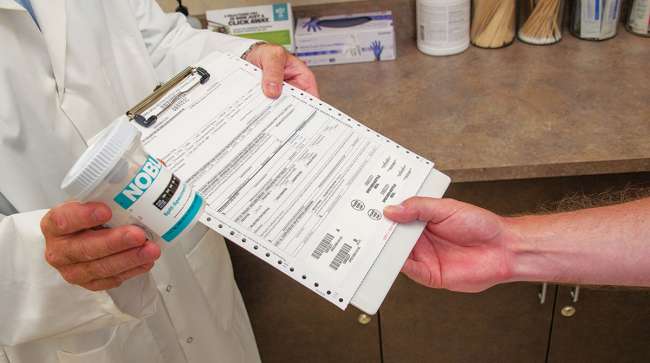Staff Reporter
New Drug & Alcohol Clearinghouse Regulations Take Effect

[Stay on top of transportation news: Get TTNews in your inbox.]
The U.S. Department of Transportation has new requirements for workplace drug and alcohol test procedures, plus another requiring states to check truck driver records in its Commercial Driver’s License Drug & Alcohol Clearinghouse.
On Nov. 5, DOT updated its drug and alcohol testing procedures to spell out temporary qualifications needed for training mock oral fluid monitors as well as who can be present when oral fluids are collected from people. These requirements take effect Dec. 5 as well as clarification about how specimen collectors must document that sufficient oral fluid quantities have been collected.
The regulation was enacted to create qualifications for oral fluid collectors, which had not previously existed, and to establish standards for monitoring and evaluating a trainee’s mock collections. The rules also prohibit anyone from being present during specimen collection except the employee being tested and a DOT agency representative as witness.
In the other new regulation, since Nov. 18 states have been federally mandated to check the Federal Motor Carrier Safety Administration’s national Drug & Alcohol Clearinghouse for any prohibitions before issuing, renewing, transferring or upgrading any CDLs (including restricted ones) and commercial learner’s permits (CLPs).
State driving license agencies, state police, the FMCSA and employers can review the online database to determine in real time if current or potential commercial drivers have prior drug and alcohol violations.
“Safety is at the core of all we do at FMCSA,” a spokesperson told Transport Topics. “This adds a layer of safety, making it more difficult for drivers to conceal their drug and alcohol program violations from current or prospective employers and evade the commercial motor vehicle driving prohibition. It also supports FMCSA’s goal of ensuring that only qualified drivers are eligible to receive and retain a commercial license, thereby making roadways safer for motor carriers and the traveling public.”
Though the FMCSA’s final rule was published in the Federal Register on Oct. 7, 2021, the date for mandatory compliance was set for Nov. 18, 2024.
According to FMCSA, the Clearinghouse not only has records of violations of drug and alcohol prohibitions (listed in 49 CFR Part 382, Subpart B), it also contains positive drug or alcohol test results and test refusals. “When a driver completes the return-to-duty [RTD] process and follow-up testing plan, this information is also recorded in the Clearinghouse,” the agency says.

Some states took pre-emptive actions months before the Nov. 18 deadline by issuing notifications to their residents.
The Wisconsin DMV, for instance, announced Sept. 13 it would begin implementing the new FMCSA Clearinghouse check ahead of schedule. It announced starting Sept. 15 all Wisconsin CDL drivers who are noncompliant with federal law would see their commercial driving privileges downgraded until they cleared their record with FMCSA. “With a license downgrade, operating a commercial vehicle is illegal,” the announcement stated. However, a commercial driver could still retain regular driving privileges.
“Our absolute No. 1 priority is safety on Wisconsin’s roads,” remarked Tommy Winkler Jr., DMV administrator. “Our project team worked for the past year to develop DMV’s path toward compliance with these new federal regulations. Among all states, Wisconsin DMV is one of the first driver licensing agencies to go live with this change.”
The New York State DMV began sending letters Sept. 23 to CDL and CLP holders who were listed as prohibited in the Clearinghouse records to notify them of their status and outline actions to regain compliance.
“CDL/CLP holders who do not complete the RTD process within 55 days of the letter will have their CDL downgraded, or their CLP canceled. New non-CDL documents will be mailed to downgraded drivers. Drivers who have had their CLP or CDL downgraded or canceled must take any tests and pay any fees associated with the upgrade or receipt of a new document,” the agency stated, adding that downgrades would begin Nov. 18.
Want more news? Listen to today's daily briefing above or go here for more info
On Oct. 17, Nebraska’s DMV warned that starting Nov. 18 any driver prohibited by the Clearinghouse has 60 days to either downgrade their CDL to a regular driver license or comply with RTD requirements. Failure to take either action will cancel their CDLs. Drivers who complete the RTD requirements can apply and test for CLPs/CDLs.
“Safety is a top priority for the department,” said Rhonda Lahm, Nebraska DMV director. “We want to do our part to ensure operators of commercial motor vehicles are qualified and safe to drive on the highways of Nebraska.”




